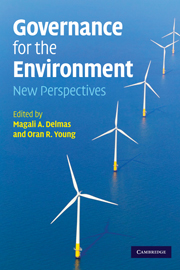Book contents
- Frontmatter
- Contents
- List of figures
- List of tables
- List of contributors
- Preface
- PART I Central threads and analytic perspectives
- Introduction: new perspectives on governahnce for sustainable development
- 1 Governance for sustainable development in a world of rising interdependencies
- PART II Governance for solving environmental problems: perspectives from economics, political science, and management
- PART III The effectiveness of governance for sustainable development
- PART IV Conclusion
- References
- Index
Introduction: new perspectives on governahnce for sustainable development
Published online by Cambridge University Press: 05 June 2012
- Frontmatter
- Contents
- List of figures
- List of tables
- List of contributors
- Preface
- PART I Central threads and analytic perspectives
- Introduction: new perspectives on governahnce for sustainable development
- 1 Governance for sustainable development in a world of rising interdependencies
- PART II Governance for solving environmental problems: perspectives from economics, political science, and management
- PART III The effectiveness of governance for sustainable development
- PART IV Conclusion
- References
- Index
Summary
We live in an era in which the demand for governance arising from human–environment interactions or, more broadly, the quest for sustainable development is growing, while confidence in the capacity of government – the conventional mechanism for handling such matters – to address problems of governance is waning. What are the sources of this paradox? What can we do to address the rising demand for governance under these circumstances? How can we expand our repertoire of mechanisms for supplying governance to avoid the onset of crises attributable to this governance deficit? These are the questions that have motivated this inquiry into the rising demand for governance and the relative merits of alternative ways to address this social challenge, with particular reference to the pursuit of sustainable development.
Our examination of this problem has yielded two broad conclusions. There is, to begin with, a critical difference between governance and government, an insight that has stimulated a lively interest in arrangements that can be characterized as governance without government (Rosenau and Czempiel 1992). In addition, there is no need to put all our eggs in one basket when it comes to meeting the demand for governance for sustainable development. Hybrid systems in which several forms of governance operate simultaneously, and even with an element of coordination, are not only possible – they are also increasingly common in the realm of sustainable development.
The paradox of rising demand and waning confidence
It is not hard to identify factors that have given rise to a growing demand for governance to address problems of sustainable development.
- Type
- Chapter
- Information
- Governance for the EnvironmentNew Perspectives, pp. 3 - 11Publisher: Cambridge University PressPrint publication year: 2009
- 15
- Cited by

